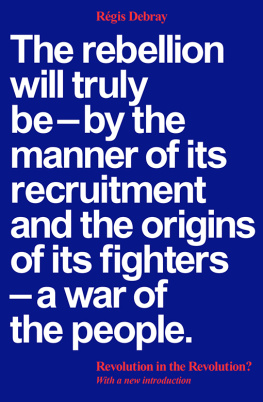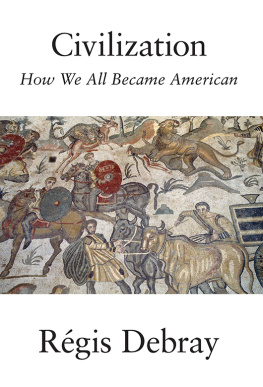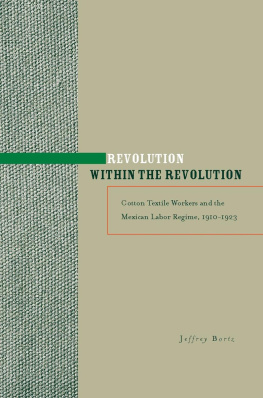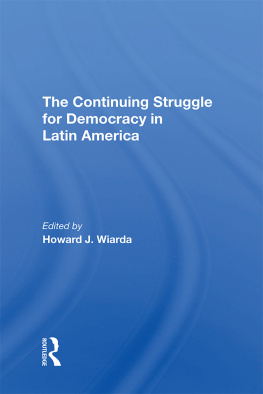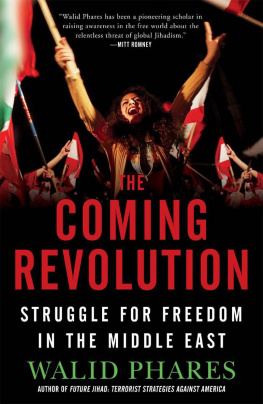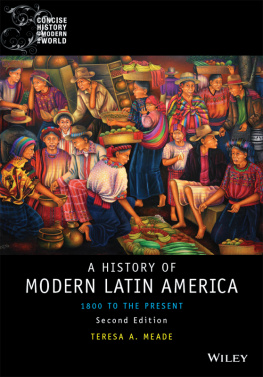Regis Debray - Revolution in the Revolution? Armed Struggle and Political Struggle in Latin America
Here you can read online Regis Debray - Revolution in the Revolution? Armed Struggle and Political Struggle in Latin America full text of the book (entire story) in english for free. Download pdf and epub, get meaning, cover and reviews about this ebook. year: 0, publisher: Penguin Random House LLC (Publisher Services), genre: Politics. Description of the work, (preface) as well as reviews are available. Best literature library LitArk.com created for fans of good reading and offers a wide selection of genres:
Romance novel
Science fiction
Adventure
Detective
Science
History
Home and family
Prose
Art
Politics
Computer
Non-fiction
Religion
Business
Children
Humor
Choose a favorite category and find really read worthwhile books. Enjoy immersion in the world of imagination, feel the emotions of the characters or learn something new for yourself, make an fascinating discovery.
- Book:Revolution in the Revolution? Armed Struggle and Political Struggle in Latin America
- Author:
- Publisher:Penguin Random House LLC (Publisher Services)
- Genre:
- Year:0
- Rating:3 / 5
- Favourites:Add to favourites
- Your mark:
- 60
- 1
- 2
- 3
- 4
- 5
Revolution in the Revolution? Armed Struggle and Political Struggle in Latin America: summary, description and annotation
We offer to read an annotation, description, summary or preface (depends on what the author of the book "Revolution in the Revolution? Armed Struggle and Political Struggle in Latin America" wrote himself). If you haven't found the necessary information about the book — write in the comments, we will try to find it.
Regis Debray: author's other books
Who wrote Revolution in the Revolution? Armed Struggle and Political Struggle in Latin America? Find out the surname, the name of the author of the book and a list of all author's works by series.
Revolution in the Revolution? Armed Struggle and Political Struggle in Latin America — read online for free the complete book (whole text) full work
Below is the text of the book, divided by pages. System saving the place of the last page read, allows you to conveniently read the book "Revolution in the Revolution? Armed Struggle and Political Struggle in Latin America" online for free, without having to search again every time where you left off. Put a bookmark, and you can go to the page where you finished reading at any time.
Font size:
Interval:
Bookmark:

IN THE REVOLUTION?
ARMED STRUGGLE AND POLITICAL
STRUGGLE IN LATIN AMERICA
RGIS DEBRAY
Translated from the authors French
and Spanish by Bobbye Ortiz

This English-language edition published by Verso 2017
First English-language edition published 1967
Originally published in French as Rvolution dans la rvolution? 1967
Rgis Debray 1967, 2017
Translation of the preface to the Verso edition Gregory Elliott 2017
All rights reserved
The moral rights of the author have been asserted
1 3 5 7 9 10 8 6 4 2
Verso
UK: 6 Meard Street, London W1F 0EG
US: 20 Jay Street, Suite 1010, Brooklyn, NY 11201
versobooks.com
Verso is the imprint of New Left Books
ISBN-13: 978-1-78663-403-0
ISBN-13: 978-1-78663-404-7 (UK EBK)
ISBN-13: 978-1-78663-405-4 (US EBK)
British Library Cataloguing in Publication Data
A catalogue record for this book is available from the British Library
Library of Congress Cataloging-in-Publication Data
A catalog record for this book is available from the Library of Congress
Typeset in Monotype Baskerville
Printed by CPI Mackays
WORKS of literature can, and must, transcend the circumstances of their publication. Political writings do not have this faculty: they have an expiry date. They are wagers on the future, laid instinctively, in the excitement of a unique, unrepeatable moment, when form is not available to sublimate content, for they are generally bereft of style or captive to a logomachy peculiar to their time. Composed in a Marxist-Leninist idiom, Revolution in the Revolution? all too evidently falls into this category.
The collective wager of which this pamphlet was intended to be a mere prop was not won. I myself registered this some years later, in A Critique of Arms (1974), a self-critical work. Fifty years after 1967, the hour of the furnaces appears to us to have been extinguished in a bloodbath. The political and social rights won by the Latin American nations, the end of the dictatorships, the restoration of freedom these were not achieved by armed vanguards, but by the reconstruction of trades unions, implantation in the shanty towns, and the revival of united opposition fronts and specifically political organizations. When Revolution in the Revolution? was conceived and distributed, the democratic process was completely blocked and state repression presaged the worst, as indicated by the murder of the wounded Che and, in a longer time frame, the 1970s, with Pinochets coup dtat in Chile, the Argentine and Brazilian dictatorships, the Condor Plan, and the liquidation without trial of opponents. Today, it is obvious that armed struggle and the theory of the foco were not correct responses to this situation. But it is also a fact that the gesture of insurrection and the example of the guerillero heroico served as a moral and symbolic spur to the more or less popular uprisings that put an end to the oligarchical terror in subsequent decades. The great figures of history are more powerful dead than alive, as attested in their different ways by a Guevara or a de Gaulle.
The small, portable textbook that Verso has decided to reprint thus belongs to history. Its value is that of a document, testimony to an era when the whiff of gunpowder was ubiquitous Algeria, Vietnam, Cuba, Mozambique, Angola and which Europeans under the age of sixty cannot but find hard to imagine. The climate of a historical moment suffers from the same defect as jazz tunes, love affairs and rages: they are difficult to share, or even understand, retrospectively, except through novels or films. That is why it is cruel to ask the author of a faded love letter to a pretty young woman who has since become an unattractive old lady to preface it half a century later.
The lady in question is the idea of Revolution. It represented a summons to the present from the future a future as imperious as it was imprecise, swimming in a haze amenable to every kind of imaginary projection, whose supporters were careful not to examine the content or outcome, but of which they could have taken the measure in the so-called socialist countries. Such is the magic of the word, which today is conjugated solely in the imperfect, but which yesterday was only employed in the future by those who believed in it. Despite its recent invention two centuries at most we must recognize in this myth of convocation the turbid ambivalence of the sovereign God among followers of revealed religions: the same charge of energy, the same dynamic power, bearer at once of a surplus of life and a surplus of death; a surplus of generosity and abnegation, at the same time as a surplus of cruelty and inhumanity; a surplus of dissidence at the outset and a surplus of bureaucracy at the end (in the best-case scenario, leaving aside camps, trials and executions). The double-edged character of a word blood red in colour, which connotes both a rising sun and an incendiary fantasy, has contributed not a little to its aura among several generations of activists or scapegoats.
This is not the place for an in-depth reflection on the value and limitations of a crucial term, which recent history has, as it were, temporarily laid off by restoring it to its original meaning, forlornly astronomical and bitterly cosmic, as the return of a star to the starting point of its orbit. Emancipation from an old order as heralding restoration of that self-same order did not feature in the dictionary of received ideas half a century ago. For now renouncing the indispensable task of the historian and philosopher, and sticking to the sensation of a writer, I must confess a certain hesitation at the belligerent tone, domineering and self-confident, of an ultimatum which, viewed from afar, is too much like a profession of faith. The lyrical illusion is perhaps not at its best when it forces itself to be didactic. But thus it was and there is no need to be embarrassed about it.
| June 2017 | RGIS DEBRAY, TRANSLATED BY GREGORY ELLIOTT |
THE circumstances under which this work was written and the identity of its author are explained in the Introduction written for the original Spanish edition by Roberto Fernndez Retamar and included in this English translation. It remains for us only to add information, useful to the reader, on developments since publication in Havana in January 1967.
To begin with, the size of the first printing (200,000 copies) and the evident eagerness of representatives of the Cuban regime to secure the widest distribution of the work both inside and outside Cuba leave no doubt that Rgis Debray, though writing only in his capacity as a private student of revolutionary theory and practice, has succeeded in presenting to the world an accurate and profound account of the thinking of the leaders of the Cuban Revolution on these subjects. It is not to depreciate Debrays contribution to say that we have here for the first time a comprehensive and authoritative presentation of the revolutionary thought of Fidel Castro and Che Guevara.
That alone would be sufficient to mark the work as one of first importance. But there is an added reason. As the very title implies, we have to do not only with a work on revolutionary thought but one which aims to revolutionize revolutionary thought. As far as Latin America is concerned, Debray and the Cuban leaders believe, the revolution will not and cannot follow one or another of the patterns traced out by the two great revolutionary upheavals of the first half of the twentieth century. The Latin American revolution is taking a third way, the first stages of which have already been revealed in the Cuban experience. Hence the need amounting to a necessity for Latin American revolutionaries to study the Cuban experience, to learn its lessons, and to guide their actions accordingly.
Font size:
Interval:
Bookmark:
Similar books «Revolution in the Revolution? Armed Struggle and Political Struggle in Latin America»
Look at similar books to Revolution in the Revolution? Armed Struggle and Political Struggle in Latin America. We have selected literature similar in name and meaning in the hope of providing readers with more options to find new, interesting, not yet read works.
Discussion, reviews of the book Revolution in the Revolution? Armed Struggle and Political Struggle in Latin America and just readers' own opinions. Leave your comments, write what you think about the work, its meaning or the main characters. Specify what exactly you liked and what you didn't like, and why you think so.

